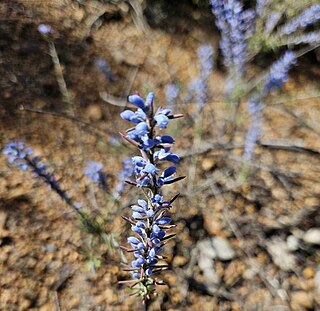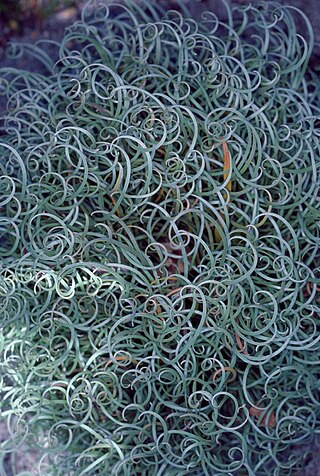
Grevillea vestita is a species of flowering plant in the family Proteaceae and is endemic to the southwest of Western Australia. It is an erect, spreading, prickly shrub with lobed leaves, the number and arrangement of lobes depending on subspecies, and more or less spherical to dome-shaped clusters of hairy, white to cream-coloured flowers sometimes tinged with pink.

Conospermum acerosum, commonly known as needle-leaved smokebush, is a species of flowering plant in family Proteaceae and is endemic to the south west of Western Australia. It is spindly, erect or straggly shrub with needle-shaped or thread-like leaves, panicles of white or pink flowers and reddish brown nuts.
Conospermum stoechadis subsp. sclerophyllum is a shrub endemic to Western Australia.

Grevillea integrifolia, commonly known as entire-leaved grevillea, is a species of flowering plant in the family Proteaceae and is endemic to the south-west of Western Australia. It is an erect shrub with egg-shaped leaves, the narrower end towards the base, and cylindrical clusters of white to creamy-white flowers.

Verticordia roei, commonly known as Roe's featherflower is a flowering plant in the myrtle family, Myrtaceae and is endemic to the south-west of Western Australia. It is a shrub with narrow leaves and is often covered with masses of creamy-white coloured flowers in late spring.

Darwinia purpurea, commonly known as the rose darwinia, is a species of flowering plant in the family Myrtaceae and is endemic to the southwest of Western Australia. It is a spreading shrub with linear leaves and dense heads of red or yellow flowers surrounded by many overlapping involucral bracts.

Pileanthus peduncularis, commonly known as coppercups, is a plant species of the family Myrtaceae endemic to Western Australia.

Thryptomene australis, commonly known as hook-leaf thryptomene, is a species of flowering plant in the family Myrtaceae and is endemic to the south-west of Western Australia. It is an erect, bushy and spreading shrub with upward-pointing leaves with the tip curving outwards, and flowers with white petals arranged spike-like near the ends of the branchlets.

Conospermum amoenum, commonly known as blue smokebush, is a species of flowering plant in the family Proteaceae and is endemic to the south-west of Western Australia. It is an erect or spreading shrub with linear leaves, and spikes of blue or white tube-shaped flowers.

Conospermum boreale is a species of flowering plant in the family Proteaceae and is endemic to the south-west of Western Australia. It is an erect, much-branched shrub with egg-shaped to elliptic or lance-shaped leaves, and panicles of woolly, white flowers.

Conospermum canaliculatum is a species of flowering plant in the family Proteaceae, and is endemic to the south-west of Western Australia. It is a dense, multistemmed, erect shrub with linear leaves and spike-like panicles of woolly white, tube-shaped flowers.

Conospermum capitatum is a species of flowering plant in the family Proteaceae, and is endemic to the south-west of Western Australia. It is a low, erect shrub with coiled leaves and head-like panicles of red to pale yellow and hairy, tube-shaped flowers.

Conospermum cinereum is a species of flowering plant in the family Proteaceae and is endemic to the south west of Western Australia. It is a spindly shrub with egg-shaped to lance-shaped leaves, loose spikes of woolly, tube-shaped white flowers and woolly nuts.

Conospermum coerulescens is a species of flowering plant in the family Proteaceae and is endemic to the south of Western Australia. It is an erect shrub with thread-like to narrowly lance-shaped leaves and spikes of up to 10 greyish-blue to deep blue, hairy flowers.

Conospermum densiflorum, commonly known as crown smokebush, is a species of flowering plant in the family Proteaceae and is endemic to the south-west of Western Australia. It is an erect, much-branched shrub with thread-like leaves at the base of the plant, and spikes or corymbs of velvety, cream-coloured or blue, tube-shaped flowers.

Conospermum filifolium is a species of flowering plant in the family Proteaceae and is endemic to the south-west of Western Australia. It is a shrub with thread-like, S-shaped leaves, and spike-like panicles of woolly white, occasionally blue, tube-shaped flowers.

Conospermum huegelii, commonly known as the slender smokebush, is a species of flowering plant endemic to the south-west of Western Australia. It is a low, clumped shrub with thread-like to narrowly cylindrical leaves, and spikes of pale blue to cream-coloured, tube-shaped flowers and hairy nuts.

Conospermum leianthum is a species of flowering plant in the family Proteaceae and is endemic to the south-west of Western Australia. It is a shrub with thread-like leaves, and panicles of white and more or less purple, tube-shaped flowers.
Conospermum microflorum is a species of flowering plant of the family Proteaceae and is endemic to Western Australia. It is a rounded shrub with glabrous, thread-like leaves, panicles of woolly hairy, white or cream coloured flowers and woolly hairy, orange-brown nuts.

Dicrastylis corymbosa is a species of plant within the genus, Dicrastylis, in the family Lamiaceae. It is endemic to Western Australia.


















